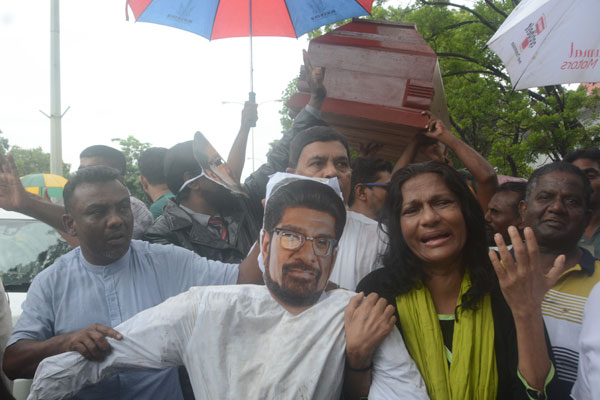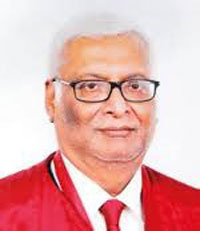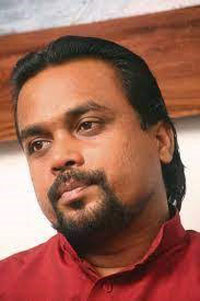Columns
‘I accept inferior drugs were brought to Lanka’ says NMRA Chairman now
View(s):- No-confidence debate against Rambukwella begins on September 6
After addressing an FDA training programme on Wednesday where he said that hence forth Lanka would take advice from the United States’ Food and Drug Administration (FDA) in the importation and regulation of medicines, he told reporters that the NMRA was ‘conducting an investigation on each of the mystery deaths that had occurred in hospitals during the last few months.’
‘We removed all those drugs from use. You may know that a patient died due to an allergy to a vaccine. It has already been ordered to send the medicine to TG Institute in Australia to check it. Currently I have removed about three or four of these drugs.’
He also ruled out the possibility of these drugs returning to Lanka saying, ‘It cannot come like that. That institution was blacklisted. The institute in India was fully blacklisted.’
Then he revealed what had been long denied by Health Minister Rambukwella, and brushed off lightly by himself. He finally confessed: ‘Some inferior drugs have arrived. For example, the medicine brought for the eyes is inferior. I accept that.’
This turns the spotlight on Health Minister Keheliya Rambukwella who faces a no-confidence motion against him next week in Parliament. It focuses on the interview he had given to the media shortly after his return from his solo mission to India to procure—without even an apothecary’s knowledge on the subject—drugs for Lanka’s government hospitals from India’s dime-a-dozen drug producers.
It certainly was an unprecedented act of pure altruistic love toward the nation’s sick, with the cost of his flight and five-star accommodation at a top Indian hotel paid out from his own personal savings and, furthermore, without a single aide at hand to offer him advice or even carry his bags. But what concerned medical doctors and the public was not his professed philanthropy but the sort of firms he was willing to do business with, with scant regard to their reputations.
This was one of the many charges that were raised at the press conference he held shortly after Christman last year. It specifically focused on why he had done business with a particular Indian drug firm, ‘Kausikh’, which was already blacklisted in Lanka. His reply, carried in the Sunday Times on January 1st, was: ‘Thousand companies were blacklisted but when they lodge an appeal, they were usually reinstated. It wasn’t new.’

PUBLIC PROTEST AT HEALTH MINISTRY: People demand Rambukwella to quit (Sunday Times photo by Gayan Amarasekara)
What is the value of blacklisting a drug company and banning it from supplying medical drugs to Lanka thereafter, if it can easily and promptly be removed on an appeal for reinstatement in the Ministry’s good books and be allowed to resupply drugs to Lanka’s state hospitals on the dubious basis of an excellent one-to-one business deal struck with the Health Minister alone in India, whilst the blacklisting was still existent back home?
And what is the position of the statutory authority, the NMRA, specifically set up by a Parliamentary Act, charged with the duty of ensuring that medical drugs which do not meet the stringent fitness test for quality are not imported to these island shores?
True, section 9 of the NMRA Act grants an exception to the NMRA board to permit ‘in an emergency and other special circumstances to import and supply a particular medicine on a request made by the Ministry of Health; or on a request made by an individual or an organisation recommended by the Ministry of Health’.

NMRA CHIEF: Professor Jayaratne
But does the Act empower anyone involved with either recommending or allowing its import to totally abandon the need to exercise diligence? And look askance when even suspicious medical drugs from companies previously blacklisted are brought down? Does section nine’s exception rule out liability for negligence? Exempt them from the legal duty to act with reasonable care, even in emergencies, the degree of which is arbitrarily determined by themselves?
Does it entitle the chief of NMRA, to cast aside his obligation to the people’s welfare, and, instead, appear to tag along with his Health Minister’s disdain for the need of drug firms to be first registered? And says at a press conference in the last week of June, that, ‘whether registered or unregistered has nothing to do with the final result, death.’ Worse. In an attempt to justify this breach, he lapses into a philosophical vein, and, with a chuckle, muses whimsically on the ‘mustard seed’ Kisa-Gotami tale in Buddhist texts; and asks the gathered journalists: ‘Is there a single home that hasn’t known death?’
Six weeks ago, Rambukwella appointed his own handpicked bunch of experts with a string of impressive letters tailing their surnames to be his chosen jurymen to stand in judgment at his own much-hyped mock trial.
As the Sunday Punch commented on August 13th, ‘they were asked to judge on the sole evidence presented ex-parte by his Ministry of Health; and to decide if the man who had hired their services—all personally lobbied on the phone and hired instantly, some even late night—was to be strictly blamed for defective drug deaths or if the patients’ own allergies were to blame.’
The jurymen sent their report to Minister Rambukwella direct. On August 9, his Ministry released a brief communique which stated that the Expert Committee had determined that five out of six deaths were due to ‘life-threatening allergic reactions’. The ministry also released 12 basic textbook recommendations for medical staff to follow when administering drugs. It added further that it was withholding the rest of the full report. Do not the people have a right to know the full result of a post-mortem inquiry financed by them? What the suppressed report contains is anybody’s guess.
But this exonerating finding by Rambukwella’s expert committee does not seem to have laid to rest the cause of mystery deaths at state hospitals. Else why would NMRA chief tell news reporters on Wednesday that NMRA was ‘‘conducting an investigation on each of the mystery deaths that had occurred in hospitals during the last few months’?
Else why, indeed, should NMRA Chief say that a vaccine which had caused a patient’s death due to an allergic response to it, ‘has been sent to the TG Institute in Australia for a thorough check?’
Why splash out extra money on expensive lab tests in Australia, why cause offence to the experts Rambukwella had hired in haste to clear his name of blame, if NMRA Chief was satisfied with the experts’ report and held the mystery of sudden deaths as solved? It is clear by his comments on Wednesday that he does not give a toss to the experts’ report but has set his heart on continuing ‘conducting an investigation on each of the mystery deaths that had occurred in hospitals during the last few months’.
Of course, Rambukwella will be least bothered by all this, as he confidently prepares this Sunday morn to weather out the no-confidence motion brought against him by the SJB, that is scheduled to be debated in the House for three consecutive days, starting from the 6th. The final vote will be held on the 8th.
For the majority SLPP, this presents the opportunity to regain at least an iota of lost public confidence by echoing in Parliament the strident voice on the street that demands Rambukwella’s resignation. Will they support the no-confidence motion and win the applause of the electorate? Nay. With their pledge publicly made to embrace Rambukwella in his hour of despair and need, they fly in the face of the people’s will. But such considerations hardly matter anymore.
The party that once claimed to be the voice of all Lanka, has now become the last refuge of hopeless failures, of the incompetents, of the corrupt, of scoundrels and convicts. A morally decadent party whose known sole strength is its majority in the House, whose power springs not from the fountain of a people’s goodwill but from hidden springs born in dark caverns that vault its mysterious black wealth.
No doubt this Friday with their pledged support and shield, Rambukwella will certainly prevail in victory. The only question is how long before the triumph turns out to be a Pyrrhic victory?
 THE CARDINAL: Warning Cardinal lambasts Monkey Bridge: Says, ‘only the people can decide’ The Archbishop of Colombo, Malcolm Cardinal Ranjith this week lambasted India’s long-term dream to rebuild the monkey bridge that Rama used as stepping stones to conquer Ravana’s Lanka; and warned the Government not to betray the people’s sovereign will nor sacrifice its unique island status in return for a mess of economic pottage. Attending a service held at the Thewatte Basilica in Ragama, the Cardinal declared: ‘While ancient kings embraced trade ties with India, they kept the cordial relationship at a safe arms distance. Pakistan, Bangladesh, Nepal, and Bhutan, all neighbours of India, share a common land border in the Indian subcontinent. Sri Lanka has remained a separate entity as an island state. Thus, if there is any proposal to build a bridge to physically link Lanka with India, it must be referred to the people at a referendum.’ Familiarity does, indeed, breed contempt or, as the Sinhalese pithily say, ‘thada sulang vassatai, thada senehe dhabaratai’. It is not in the hands of any President nor in the power of a 225-strong Parliament to decide on the fate of Lanka’s continued existence as an island state; and to deny the wish of its inhabitants to remain as a race of islanders. The island’s territorial integrity can only be destroyed by the people alone at a referendum. But even they should be reminded they are only the temporary caretakers of this island mass and their primary duty, to bequeath it to their descendants as they had found it. | |
| We built hand grenade first: Wimal Another little-known fact of the genius of the Sinhalayas’ to have invented the world’s first hand grenade and used the ‘iron balls and gun powder’ packed hand bomb to resist the Portuguese invasion 800 years ago, was revealed by Wimal Weerawansa this week. He did not source this black pearl of info to any Sinhalese book for the simple reason that—as he himself admitted— ‘no Lankan book has ever recorded this historic first. Instead, he said he had found the jewel buried in some Portuguese book, the name of which he didn’t mention.  WIMAL: Lobs an apocryphal bomb Addressing a Battaramulle Town Hall meeting on the subject ‘Is Ranil the answer, or is he the problem?’ this veteran firebrand who himself is not averse to tossing a verbal bomb or two—for instance, in October 2017, in the presence of his then two idols, the Rajapaksa duo, Mahinda and Gota—he treasonously said, ‘Parliament must be bombed from above and wiped out of existence if it dared to pass a new constitution as proposed by the Yahapalana government – declared: ‘’I am reminded of the ‘Battle of Mulleriyawa’ that our troops fought with the Portuguese. This is not found in any Sinhala book but can be found in a Portuguese book. It says ‘The Sinhalese forces attacked us that day with a weapon called a grenade. A large number of our troops were killed by the blows of those weapons, some were injured.’ The Portuguese wrote that. And about the nature of that weapon, they say, ‘It was made using small iron balls, gunpowder, and thread.’ The English army called this a ‘grenade’. But what we didn’t know was that it was our warrior ancestors who gave birth to grenades’. Pity he did not reveal the title of the Portuguese sourcebook. But no matter. Who needs such verification when one strikes a blow for Sinhalese chauvinism by any reference to Sinhalese ingenuity in the glorious days of yore to bolster the Sinhala ego and assuage the present despondency? But his claim that Lankans had thrown a homemade hand grenade in the 16 century is not as far-fetched as it may seem. Legend has it that the first known throwaway bomb was a ball packed with deadly snakes and flung into the enemy camp. Eleventh-century Chinese historians have recorded that a gunpowder caltrop was one of the first hand grenades built by a soldier named Tang Fu in 1000 AD. So it’s entirely within the ambit of possibility and imagination to vividly entertain the idea that some wily Lankan had nicked off some gunpowder from a wandering Chinese explorer—the Chinese being the first to have discovered it in the 9th century AD—and left it to his inventive genius to realise its potential use in event of foreign invasion. But this one-off use of this weapon of mass destruction was not further used against the Dutch or the British—unless Wimal’s research comes up with another reference hidden in some old unnamed Dutch book—remains a mystery. The wonder is why no Sinhalese chronicler has ever recorded this notable invention in either stone or papyrus. But what does boggle the mind most is the relevance of Wimal lobbying the apocryphal hand grenade story at a seminar to discuss whether his political foe Ranil is the answer or the problem?
|
Buying or selling electronics has never been easier with the help of Hitad.lk! We, at Hitad.lk, hear your needs and endeavour to provide you with the perfect listings of electronics; because we have listings for nearly anything! Search for your favourite electronic items for sale on Hitad.lk today!


Leave a Reply
Post Comment